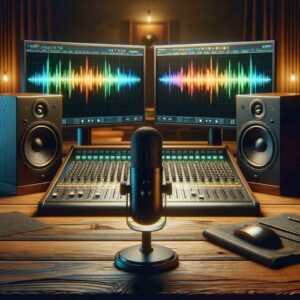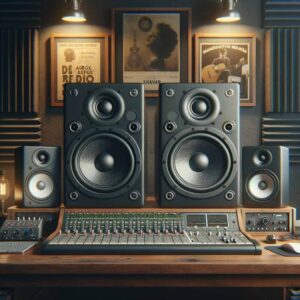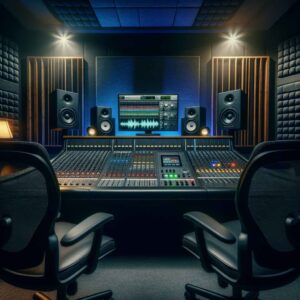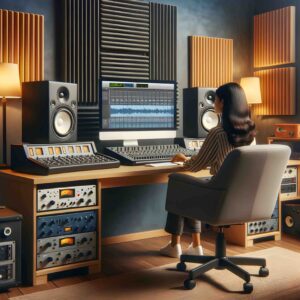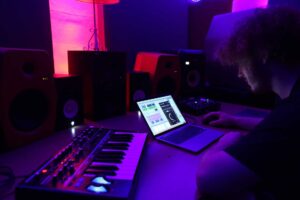Are you wondering whether you should buy a laptop or desktop for music production?
When I started producing in 2010, laptops weren’t as powerful as they are today.
But a lot has changed.
These days, desktops and laptops are both excellent choices for music production.
However, the best choice depends on whether you’re a stationary or mobile producer.
This post will compare the two computer options and explain why desktops are better unless you need a portable solution.
Here’s a brief overview.
Overview
A desktop computer is typically more powerful than a laptop. This extra power can be helpful if you’re working with demanding software.
On the other hand, laptops are more portable, making them a better option if you need to take your setup with you on the go.
Laptop or Desktop for Music Production
Should you use a laptop or desktop for music production?
There are many reasons why a desktop computer is better for music production than a laptop.
Firstly, desktop computers have stronger processors and larger hard drives, meaning they can handle more complex audio editing and processing tasks.
Secondly, desktop computers often have more expansion slots and ports, making connecting external devices such as MIDI controllers and audio interfaces easier.
Finally, desktop computers are generally less expensive than laptops, making them a more budget-friendly option for music producers.
With that said, a laptop is only the better option if your need a portable, compact solution.
Benefits of Using a Desktop for Music Production
- Powerful CPU
- Cost-efficient
Powerful CPU
Generally, a desktop’s CPU has more processing cores and a higher clock speed than a laptop’s – at the same price.
CPUs with higher clock speeds and more cores generate more heat.
However, desktops have more internal space for cooling.
On the other hand, laptop manufacturers limit clock speed to prevent overheating.
As a result, on average, you’ll get better performance from a desktop than a laptop.
Related Post: Best CPU for music production
Cost-Efficient
A desktop will have more CPU power, memory, and storage space than a laptop at the same price.
Prioritizing portability means sacrificing power and quality in the world of computers.
Other Benefits
- Desktop monitors are typically larger and higher quality than laptop screens
- Desktop keyboards and mice are usually more natural to use than laptop trackpads and keyboards, making navigating your DAW easier.
Downsides of Using a Desktop for Music Production
- Immobile
- Requires additional hardware
Immobile
The apparent downside of desktops is their immobility.
Depending on the type of producer you are, a desktop may not work for you.
Many producers prefer laptops because they can produce on the go and take their work to other studios.
Requires Additional Hardware
You’ll need a monitor, keyboard, and mouse if you purchase a desktop.
These additional purchases will make a desktop less cost-efficient.
Keyboards and mouses are inexpensive, but a good monitor can range between $100-$200.
Benefits of Using a Laptop for Music Production
- Portable
- Compact
- Convenient
A laptop for music production can offer several benefits over a traditional desktop computer.
First, a laptop is much more portable, making it easy to take your music wherever you go.
Since it has a smaller footprint than a desktop, it’s also more convenient for limited studio spaces.
Laptops are More Portable than Desktops
Laptops are more portable than ever, with some models weighing less than 4 pounds.
Their portability makes them ideal for traveling musicians. And since they’re battery-powered, you can use them anywhere without worrying about being tethered to an outlet.
They also usually have all the necessary computer components (mouse, screen, keyboard, USB ports) in a compact design.
Compact
Laptops are more compact than desktops and take up far less room, making them an excellent choice for producing in smaller studios.
Since laptops take up less space on a desk, leaving more room for your other music production gear.
Downsides of Using a Laptop for Music Production
- Small components
- More expensive than desktops
Small
The compact nature of laptops can also be a downside if you’re not looking for a portable computer.
Laptops have smaller screens, and some users find audio editing with a laptop mouse challenging.
If you choose the laptop path, you can purchase a separate monitor and mouse to mitigate these issues.
Additionally, laptops tend to have fewer USB ports than desktops.
Consider purchasing an external USB port to connect external hardware (midi controllers, audio interfaces, external hard drives, etc.) if you’re using a laptop.
More Expensive
Laptops are more compact, which makes them more expensive to produce.
Laptop manufacturers are tasked with producing a smaller unit that’s as powerful as a desktop (with the same specs). As a result, laptop parts tend to be more expensive.
A Third Option: Using a Tablet for Music Production
These days, tablets are becoming more advanced, making them an interesting option for music producers.
Tablet Benefits
Portability
I’ve personally made beats on a plane, bus, or in a car with just a tablet alone.
Some tablets are as powerful as some laptops at a fraction of the size.
Cross-Functionality
In our opinion, a touchscreen is the greatest benefit of producing on a tablet.
You can instantly transform your tablet into a drum pad, mixing board, or MIDI keyboard.
Overall, a tablet is a great option for hands-on producers looking to save money on hardware.
Tablet Downside
Not the Best Option for Home Studios/Everyday Production
While tablets are a great choice for travel, desktops are far better for home studios.
Viewing your DAW on a large screen and using a mouse to navigate your DAW creates a better production experience.
It’s possible to use external hardware with a tablet, but desktops are more cost-efficient – and better equipped to handle heavier workloads.
Takeaway: Laptop or Desktop for Music Production?
Desktop or laptop?
The answer depends on your style as a producer.
The best option is almost always a desktop for home studio use.
However, if you’re constantly on the go or love collaborating, we suggest using a laptop or tablet.
Summary
Desktops
- Better for home studios
- More cost-efficient than laptops and tablets
Laptops
- Great for travel and collaboration
Tablets
- Excellent for producing on long trips
- A great option for hands-on producers looking to save money on hardware


